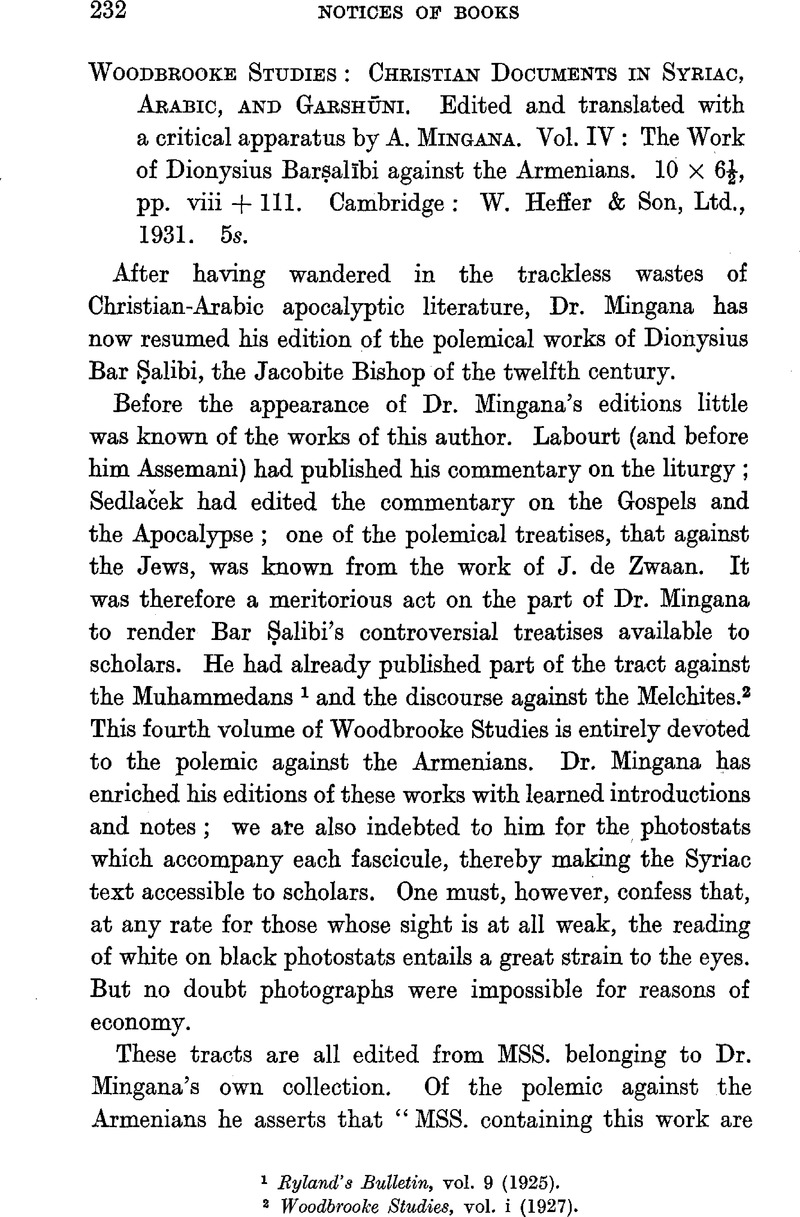Article contents
Woodbrooke Studies: Christian Documents in Syriac, Arabic, and Garshūni. Edited and translated with a critical apparatus by A. Mingana. Vol. IV: The Work of Dionysius Barṣalībi against the Armenians. 10 × 6½, pp. viii + 111. Cambridge: W. Heffer & Son, Ltd., 1931. 5s.
Published online by Cambridge University Press: 15 March 2011
Abstract

- Type
- Notices of Books
- Information
- Copyright
- Copyright © The Royal Asiatic Society 1933
References
page 232 note 1 Ryland's Bulletin, vol. 9 (1925)Google Scholar.
page 232 note 2 Woodbrooke Studies, vol. i (1927)Google Scholar.
page 233 note 1 See Assemani, , Bibliotheca Orientalis, tom. 2, p. 210Google Scholar.
page 233 note 2 Ryland's Bulletin, vol. 9 (1925), p. 188Google Scholar.
page 234 note 1 Dr. A. Fortescue maintains, however, that the use of unleavened bread in the liturgy is certainly a Latin infiltration. As to the use of pure wine in the chalice, he notes: “This custom is said to have begun as a reaction against heretics (Enkratites), who consecrated only water. See The Lesser Eastern Churches, p. 442, and p. 30 in Bar ṣalībī's polemic here reviewed.
page 235 note 1 See Tosephta, , Bēṣāh ii, 15Google Scholar, and parallels.
page 235 note 2 Cf. Fortesoue, op. cit., p. 441. “An ancient Armenian abuse is the sacrifice of beasts. A bull, cow, sheep, or fowl is brought to church in procession; a chapter of the Bible is read, salt is put in its mouth, and it is killed, then divided as a feast. The bishops try to put down this piece of paganism.” (The italics are mine.)
page 235 note 3 p. 7, note 3.
page 235 note 4 The passage on p. 13. “I was fashioned into flesh in the womb of my mother, while I was in it formed of blood for ten months,” is a quotation from Wisdom vii, 2.
page 236 note 1 The verb a'medh is transitive.
page 236 note 2 Adopting Dr. Mingana's emendation.
page 236 note 3 'ᾰṣabh= “sanavit” as well as “obligavit”, and DrMingana, has supplied the words: “And poured into them” from Luke x, 34Google Scholar.
- 1
- Cited by




